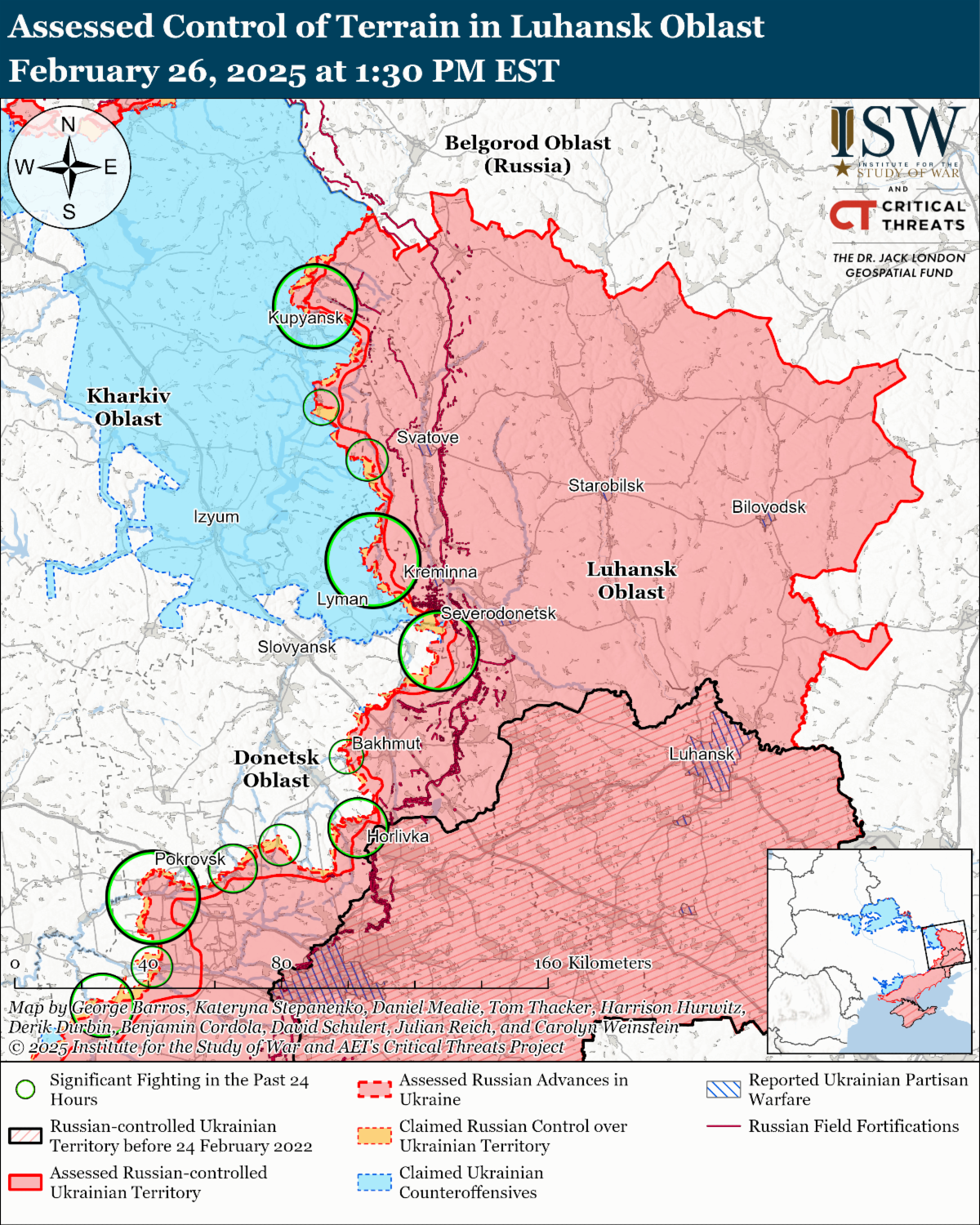US President Donald Trump and Ukrainian President Volodymyr Zelensky are planning to meet at the White House on February 28, likely to sign a US-Ukraine mineral deal. A draft agreement of the deal published ahead of the meeting does not provide US security assistance or security guarantees to Ukraine, however. The Financial Times (FT) published a draft bilateral US-Ukrainian deal on February 26 that states that the United States wants to "invest alongside Ukraine in a free, sovereign and secure Ukraine" and supports "Ukraine’s efforts to obtain security guarantees needed to establish lasting peace" but does not include any concrete US provisions of security assistance or guarantees to Ukraine. Continued US security assistance to Ukraine is essential to help Ukraine set conditions for a lasting and just resolution of the war that is in the interests of Ukraine, the United States, and Europe.
Russian officials directly involved in negotiations with the United States continue to insist that any peace agreement to resolve the war in Ukraine must be based on Russia’s 2021 demands. They also insist on the surrender to Russia of territory that Ukrainian forces currently hold that is home to major cities and well over a million people. Russian Foreign Minister Sergei Lavrov, who recently led the Russian delegation at the February 18 US-Russian negotiations in Riyadh, Saudi Arabia, claimed on February 26 that negotiations that result in freezing the current frontlines in Ukraine are impossible because the Russian Constitution stipulates that Russia’s borders include all of Ukraine’s Donetsk, Luhansk, Kherson, and Zaporizhia oblasts. Russia currently does not occupy large parts of Donetsk, Kherson, and Zaporizhia oblasts and a small part of western Luhansk Oblast. Lavrov also stated that Russia will reject any peace deal that involves continued Western arms provisions to Ukraine. Lavrov is repackaging the maximalist demands Russia has long made of Ukraine using a pseudo-legal facade, despite the illegitimacy of Russian annexations of Ukrainian territory under international law. Lavrov likely attempted to justify Russia's long-standing demands by framing the Russian Constitution as a legal and hence “necessary” element in future negotiations with the United States. Russian officials have previously invoked “denazification,” the alleged Ukrainian violations of Russian-speaking minorities’ rights, and the false historical narrative that Ukraine is inherently part of Russia to justify their territorial claims against Ukraine and to call for full Ukrainian capitulation.
Russia is demanding that Ukraine surrender several large cities that Russian forces do not currently occupy and have no prospect of seizing, handing over one million Ukrainians over to Russia. Russia’s occupation of the remainder of the four Ukrainian oblasts would include large cities such as Kherson City (pre-war population of about 275,000), Kramatorsk (147,00 people), and Zaporizhzhia City (706,000 people) — all of which remain under Ukrainian control. The Russian occupation of such large population centers would significantly escalate the humanitarian catastrophe in Ukraine. Russian authorities would likely employ the same tactics of oppression, displacement, and forcible assimilation to Ukrainian civilians living in these areas as they have employed against the millions of Ukrainians who have been living under Russian occupation for over three years. Russian advances have recently stalled along the frontline, and Russian forces increasingly face unsustainable vehicle and personnel losses, indicating that Russian forces will likely be unable to occupy the full extent of these oblasts through military means in any short period of time if at all. Lavrov’s rhetoric is likely an attempt to achieve through negotiations what the Russian military cannot achieve by force. The Kremlin’s stated intent of seizing more of Ukraine's land and people directly contradicts US and European efforts to achieve a sustainable and lasting peace in Ukraine and reinforces Russia’s continued efforts to illegally occupy Ukrainian territory rather than to negotiate in good faith or offer concessions.
Key Takeaways:
- US President Donald Trump and Ukrainian President Volodymyr Zelensky are planning to meet at the White House on February 28, likely to sign a US-Ukraine mineral deal. A draft agreement of the deal published ahead of the meeting does not provide US security assistance or security guarantees to Ukraine, however.
- Russian officials directly involved in negotiations with the United States continue to insist that any peace agreement to resolve the war in Ukraine must be based on Russia’s 2021 demands. They also insist on the surrender to Russia of territory that Ukrainian forces currently hold that is home to major cities and well over a million people.
- Russia is demanding that Ukraine surrender several large cities that Russian forces do not currently occupy and have no prospect of seizing, handing over one million Ukrainians over to Russia.
- Lavrov's and other Kremlin officials' continued rejections of a ceasefire and other terms that US President Donald Trump and European leaders have identified as necessary to achieve a lasting peace in Ukraine demonstrate that Russian President Vladimir Putin remains uninterested in meaningful negotiations and assesses that he can achieve his war objectives militarily in the medium- to long-term.
- Ukrainian forces recently advanced near Toretsk and Pokrovsk, and Russian forces recently advanced near Kupyansk, Chasiv Yar, Kurakhove, Velyka Novosilka, and Robotyne.
- Russian officials proposed that the Russian Federal Security Service (FSB) assume control over all Russian pretrial detention facilities amid reports that the FSB is in charge of a pretrial detention facility linked to the abuse of Ukrainian prisoners of war (POWs).
| 




 [ISW] 이란 업데이트, 2025년 2월 26일
[ISW] 이란 업데이트, 2025년 2월 26일
 [ISW] 러시아의 공세 캠페인 평가, 2025년 2월 25일
[ISW] 러시아의 공세 캠페인 평가, 2025년 2월 25일